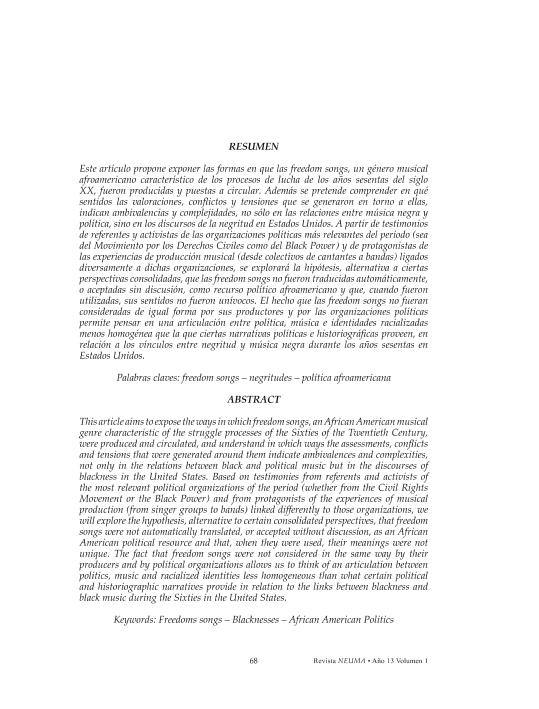Mostrar el registro sencillo del ítem
dc.contributor.author
Gatto, Ezequiel Guillermo

dc.date.available
2021-09-28T20:35:10Z
dc.date.issued
2020-06-01
dc.identifier.citation
Gatto, Ezequiel Guillermo; "Una canción puede cambiar tu condición" las freedom songs como materia de aglutinamientos y tensiones en torno a los sentidos de la negritud en la política afroamericana: Estados Unidos 1955-1971; Universidad de Talca; Neuma; 13; 1; 1-6-2020; 68-111
dc.identifier.issn
0719-5389
dc.identifier.uri
http://hdl.handle.net/11336/141775
dc.description.abstract
Este artículo propone exponer las formas en que las freedom songs, un género musical afroamericano característico de los procesos de lucha de los años sesentas del siglo XX, fueron producidas y puestas a circular. Además se pretende comprender en qué sentidos las valoraciones, conflictos y tensiones que se generaron en torno a ellas, indican ambivalencias y complejidades, no sólo en las relaciones entre música negra y política, sino en los discursos de la negritud en Estados Unidos. A partir de testimonios de referentes y activistas de las organizaciones políticas más relevantes del período (sea del Movimiento por los Derechos Civiles como del Black Power) y de protagonistas de las experiencias de producción musical (desde colectivos de cantantes a bandas) ligados diversamente a dichas organizaciones, se explorará la hipótesis, alternativa a ciertas perspectivas consolidadas, que las freedom songs no fueron traducidas automáticamente, o aceptadas sin discusión, como recurso político afroamericano y que, cuando fueron utilizadas, sus sentidos no fueron unívocos. El hecho que las freedom songs no fueran consideradas de igual forma por sus productores y por las organizaciones políticas permite pensar en una articulación entre política, música e identidades racializadas menos homogénea que la que ciertas narrativas políticas e historiográficas proveen, en relación a los vínculos entre negritud y música negra durante los años sesentas en Estados Unidos.
dc.description.abstract
This article aims to expose the ways in which freedom songs, an African American musical genre characteristic of the struggle processes of the Sixties of the Twentieth Century, were produced and circulated, and understand in which ways the assessments, conflicts and tensions that were generated around them indicate ambivalences and complexities, not only in the relations between black and political music but in the discourses of blackness in the United States. Based on testimonies from referents and activists of the most relevant political organizations of the period (whether from the Civil Rights Movement or the Black Power) and from protagonists of the experiences of musical production (from singer groups to bands) linked differently to those organizations, we will explore the hypothesis, alternative to certain consolidated perspectives, that freedom songs were not automatically translated, or accepted without discussion, as an African American political resource and that, when they were used, their meanings were not unique. The fact that freedom songs were not considered in the same way by their producers and by political organizations allows us to think of an articulation between politics, music and racialized identities less homogeneous than what certain political and historiographic narratives provide in relation to the links between blackness and black music during the Sixties in the United States.
dc.format
application/pdf
dc.language.iso
spa
dc.publisher
Universidad de Talca
dc.rights
info:eu-repo/semantics/openAccess
dc.rights.uri
https://creativecommons.org/licenses/by/2.5/ar/
dc.subject
FREEDOM SONGS
dc.subject
NEGRITUDES
dc.subject
POLÍTICA AFROAMERICANA
dc.subject.classification
Ciencias Sociales Interdisciplinarias

dc.subject.classification
Otras Ciencias Sociales

dc.subject.classification
CIENCIAS SOCIALES

dc.title
"Una canción puede cambiar tu condición" las freedom songs como materia de aglutinamientos y tensiones en torno a los sentidos de la negritud en la política afroamericana: Estados Unidos 1955-1971
dc.title
“Song can change your condition” freedom songs as a matter of agglutinations and tensions around the meanings of blackness in african american politics: United States 1955-1971
dc.type
info:eu-repo/semantics/article
dc.type
info:ar-repo/semantics/artículo
dc.type
info:eu-repo/semantics/publishedVersion
dc.date.updated
2021-09-06T20:59:35Z
dc.identifier.eissn
0718-7017
dc.journal.volume
13
dc.journal.number
1
dc.journal.pagination
68-111
dc.journal.pais
Chile

dc.journal.ciudad
Talca
dc.description.fil
Fil: Gatto, Ezequiel Guillermo. Consejo Nacional de Investigaciones Científicas y Técnicas. Centro Científico Tecnológico Conicet - Rosario. Investigaciones Socio-históricas Regionales - Universidad Nacional de Rosario. Investigaciones Socio-históricas Regionales; Argentina
dc.journal.title
Neuma
dc.relation.alternativeid
info:eu-repo/semantics/altIdentifier/url/https://neuma.utalca.cl/index.php/neuma/article/view/14
dc.relation.alternativeid
info:eu-repo/semantics/altIdentifier/doi/http://dx.doi.org/10.4067/S0719-53892020000100068
Archivos asociados
